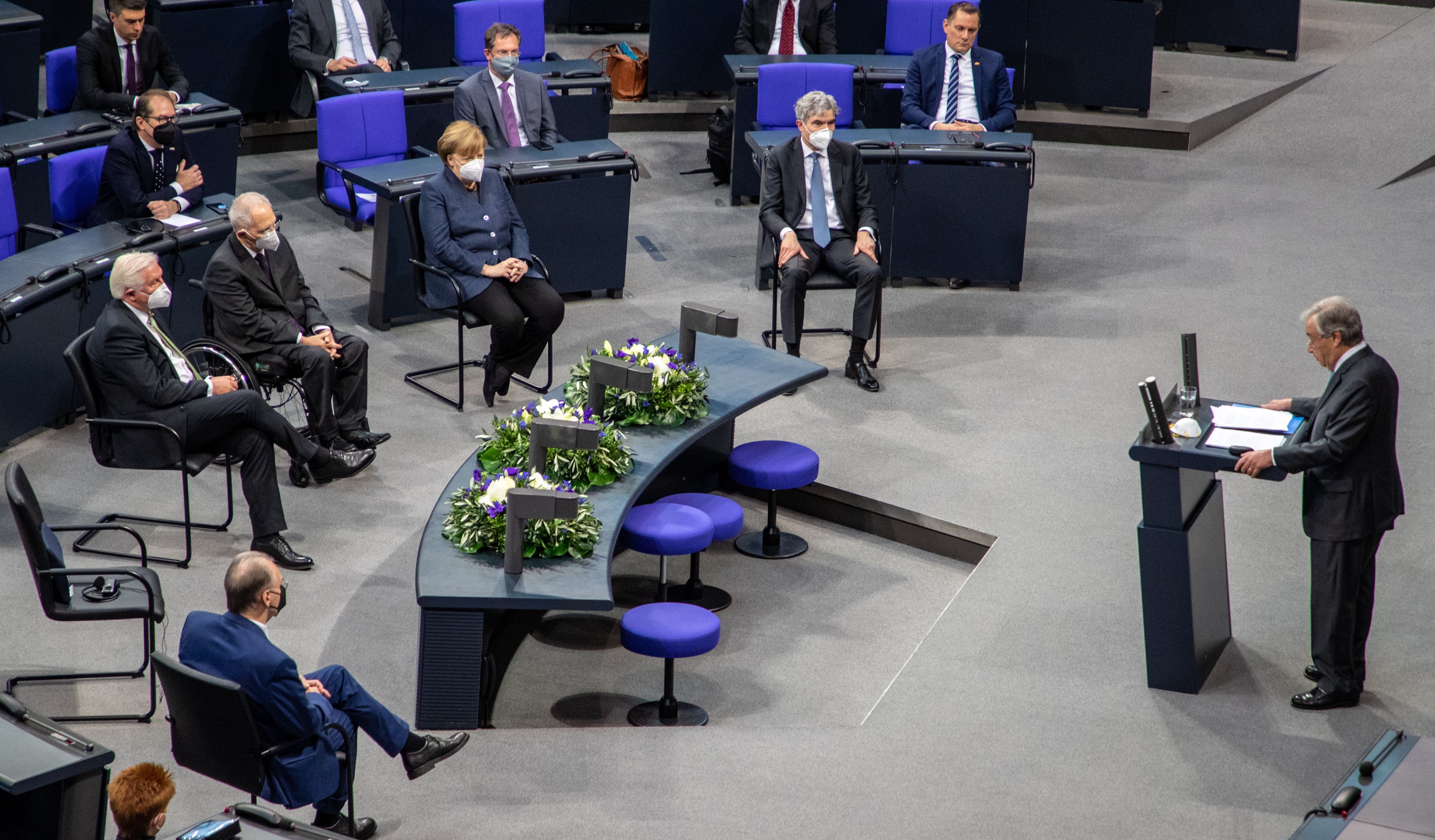
The implementation of the Next Generation EU (NGEU) fund is key to returning the Union’s economy to a stable growth path after the severe crisis caused by the COVID-19 pandemic. Agreed by the Member States in December 2020, the programme provides for €750 billion in support in the form of grants and loans. They are to be financed by issuing common debt, which is an institutional innovation.
However, for the disbursements to start, the approval of the decision on “EU own resources system” by national authorities is required. So far, this has been successful in 16 Member States. Last week, though, in Germany the ratification law was blocked by a constitutional complaint lodged by opponents of the NGEU and the procedure suspended by the Federal Constitutional Court (Bundesverfassungsgericht, BVG). The resolution adopted in Karlsruhe raised concerns that, instead of starting payments already in July this year, the EU is facing a legal clinch, which could be very costly to the European economy and politics.
Confrontation Mode
The dispute over the recovery fund in Germany should come as no surprise. Almost every decision to deepen integration has in the past provoked formal complaints to the Constitutional Court by individuals and associations sceptical of the EU. This was the case with the creation of the European Stability Mechanism (ESM) and aid programmes for Greece, the banking union, and more recently the bond purchases by the European Central Bank. The present complaint was prepared by the “Alliance of Citizens’ Wills” (Büdniss Bürgerwille), behind which is, among others, Prof. Bernd Lucke, founder and former member of Alternative for Germany (AfD) and a veteran of legal disputes over monetary and financial integration.
When on 26 March this year the Bundestag and the Bundesrat finished voting on the ratification act, the Alliance submitted an application, supported by more than 2,000 signatures, to the Constitutional Court to examine the compliance of the new institution with the constitution. An important part of it was the demand that the court stop the president of the Federal Republic of Germany from signing the ratification act until the case is resolved. Thus, the decisions of both houses of parliament would not have legal effect yet.
In similar cases in the past, the BVG had informally agreed with the president’s office to stop the procedure to give judges time to hear the case, for example, in 2012 when the issue of the ESM rescue fund was placed on the list. This time, however, the court decided to take the formal path by issuing a resolution explicitly forbidding the president from signing. There are two possible explanations: either officials of the office of the president announced that the procedure would be finalised despite the complaint, or the judges decided that the dispute was a good opportunity to emphasise the BVG’s role in the law-making system and relations with EU institutions. The court did not justify the resolution (an explanation is to be delivered at a later date), which only confirms the non-standard course of events. Public opinion could read the whole situation as an announcement of confrontation and a serious problems with the final approval of the reconstruction fund.
Arguments
The authors of the complaint lodged by the Alliance primarily question the legitimacy of the possibility of incurring common debts. The EU, they claim, is obliged under the treaty to plan the budget based on its “own resources”, but the recovery fund is to be fuelled by “external” capital obtained from the issuance of bonds. In addition, Germany would have to pay debt owed by another state in the event of insolvency. This would violate the principle that there should be no shared responsibility for liabilities incurred. The Alliance’s allegations also concern the limitation of the budgetary powers of the Bundestag due to the right of the European Commission to charge the Member States with additional contributions to pay off the debt. In their opinion, the project of the reconstruction fund in its current shape is just a “road to a fiscal union”, which should be carried out in a different manner, namely by amending the constitution of Germany.
The views of the authors of the complaint can hardly be considered isolated. A similar view was previously signalled by the Bundesbank, which demanded that common debt obligations be included in the national debt accounts. In March this year, the Federal Audit Office (Bundesrechnungshof, BRH) also joined the discussion. In the published report, it warns that the reconstruction fund in its current form may violate the principle of states’ responsibility for their own debts, will facilitate the circumvention of EU fiscal rules, and also constitutes an insufficiently legitimate expansion of EU primary law into an area of national competences. The BRH demands the preparation of a precise bond repayment plan, moreover, the Bundestag should clearly declare that it is a one-off programme and not a new community institution.
This position critical of the construction of the NGEU can count on political support, even if silently expressed. From the very beginning, the conservative wing of the Christian Democrats and members of the liberal FDP distanced themselves from the triumphant statements of Olaf Scholz, the Social Democratic Minister of Finance, who described the fund as a “Hamiltonian moment” in establishing a fiscal union in the EU. Although they support an increase in anti-crisis spending, they look at the reaction of the Constitutional Court with satisfaction—a necessary warning for supporters of the hasty federalisation of EU finances.
Conclusions
The prevailing opinion among experts is that the Constitutional Court will pass judgment within a few weeks allowing the president to sign the law, with several additional formal requirements and restrictions. This would be a repeat of the scenario from 2012 when the fate of the ESM was at stake, and from 2020 when judges ruled on the purchase of bonds by the ECB. The basis for optimism is the fact that the BVG has not yet commented on the merits, so there is no clear indication of a critical position among the judges. Moreover, the fact that the European Council chose “a state of emergency” to justify the decision to set up the fund seriously weakens the arguments contained in the complaint.
However, no one can exclude a scenario in which the court gives itself more time to issue a judgment or one in which it asks the Court of Justice of the European Union (CJEU) for a preliminary ruling related to the disputed provisions. This would mean a block on the reconstruction fund for months, maybe even years. If this becomes the case, the EU would face a serious crisis.
In economic terms, the southern countries, which would benefit most from the fund, would be particularly affected. However, any delay or outright absence of the recovery programme would hit the entire economy of the Union and weaken its position against global competitors, including China, which claims to have recovered from the pandemic, and the U.S., which is currently implementing a $1.9 trillion support programme. The chances of achieving ambitious goals in climate policy and the digitisation of the European economy would decrease too. At stake also in the reconstruction fund ratification is the credibility of the European integration process itself as a political response to the challenges of today. Therefore, in a pessimistic scenario, attempts to save the programme should be expected. They may consist of changing the German constitution, transitional financing of the NGEU from national bonds, or creating a new expenditure tool, this time at the intergovernmental level, for example, with the use of the ESM.
Problems with the implementation of the reconstruction fund pose an obvious risk for Poland. A delay or lack of funds reduces the chances of a quick recovery from losses incurred during the pandemic as well as the implementation of modernisation projects. Increased uncertainty in the markets could cause fluctuations in the zloty exchange rate and adversely affect the conditions of financing public debt. The very attempt to save the fund in some other form could also become a challenge. It cannot be ruled out that, for example, a new programme on an intergovernmental basis would be addressed only to the euro area or ERM II-related countries, and would contain much stricter conditions regarding internal reforms or the rule of law.




